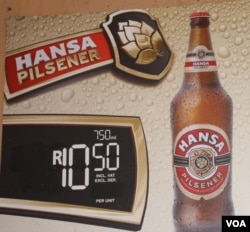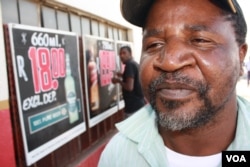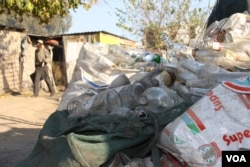Balls clack and bottles clink as men shoot pool inside a smoky tavern in Diepsloot, a sprawling, impoverished township north of Johannesburg.
The table on which they’re playing is cracked, stained and warped. It’s supported on one side by a rusty, oil-soaked car wreck. Near the bar’s entrance, piles of beer bottles rise from mounds of smoking rubbish, set afire by residents because the government never picks up the trash here.
Everywhere on this early Friday evening, people stagger in the streets.
“Everyone wants to get drunk and forget,” says Glenys van Halter, who has been running community projects in Diepsloot for 20 years, working among the thousands of scrap metal and wood shacks where crime, disease and poverty reign.
The elderly woman with long red hair says “all hell is about to break loose” in the township because it’s the start of a weekend at the end of the month. The few people here with jobs have received salaries, and residents have been paid their government grants.
With money in their pockets, says van Halter, many "only have one thing on their minds: to get as drunk as possible as fast as possible."
"There’s too much alcohol being consumed, there’s too much aggression. There’s a lot of people who are angry. They’re unemployed. They’re living in disgusting conditions. They’re frustrated and so they drink [and] there are fights," she explains.
Alcohol is behind ‘everything bad’
The World Health Organization last year branded South Africa the “drunkest country on the African continent.” In research it released in 2014, it found South Africans who drink liquor each consume on average more than 27 liters of pure alcohol annually. This is about 10 liters more than the global average, and much higher than almost everywhere else in Africa.
Safety and security NGOs blame high alcohol use for much of South Africa’s violent crime, especially crimes against women and children. Nowhere is this more prevalent than in Diepsloot.
Van Halter describes the area’s shebeens, as the taverns are known in South Africa, as “wellsprings of chaos.”
She says abuse of liquor is the “major fuel for just about everything bad” that happens in the township.
Van Halter adds that perpetrators almost always begin drinking in shebeens before committing crimes.
“Whatever the ideas were in their heads in the first place, alcohol fuels it and makes it easier to carry out,” she says.
A veteran police officer says he’s never worked in a place before where so many people drink to get drunk, all the time.
“That’s how they kill each other. Most of the murders that we have, they kill each other in the taverns; they kill each other on the street, while they’re drunk," he says.
The policeman, who wants to remain anonymous, says most shebeens in Diepsloot are unlicensed. They sell alcohol illegally to anyone who has money, including children, and they sometimes also sell on credit.
South Africa’s National Liquor Authority describes the country’s illegal trade in alcohol as “much bigger than what is reported.”
Fatal stabbing; rat attack
Across the road from a bustling taxi stand, a jovial Gift Munetsi packs beer into a big freezer in the tavern that he manages.
He says so many people in Diepsloot drink because “booze is much cheaper here than in the suburbs.”
A sign on Munetsi’s wall advertises a 750-milliliter beer for just 10 rand 50, less than a dollar. He charges just 10 rand for a shot of a popular brandy.
Munetsi acknowledges there’s sometimes “terrible violence” in his bar. Recently, patrons began fighting over a soccer match on TV, and a man stabbed another customer in the neck with a screwdriver.
“He died outside,” says the bar manager, fingering his jugular.
Community leader Brown Lekekela says people get drunk in Diepsloot because shebeens are just about the only sources of entertainment in the area. There’s just one family park for 600,000 residents. There are no gyms, no sports fields, no cinemas.
Lekekela says he’s “sick” of witnessing the consequences of alcohol abuse in Diepsloot.
He tells of a woman who locked her baby in her shack, alone, and went out drinking. Neighbors rescued the screaming infant, but not before rats had “bitten holes” all over her tiny body.
“It was awful, like in the feet, in the fingers, in the mouth – where they [the rats] smelled the food; there in the feet and mouth, nose… And blood all over the kid,” says Lekekela.
He asserts that such incidents of child neglect, “triggered” by excessive consumption of alcohol, “happen all the time” in Diepsloot.
Lekekela, who’s also a rape counselor, says rapists often target women who drink at the shebeens.
Jennifer Mashego – not her real name – says she was attacked after a “heavy” session at a tavern.
She explains: “Me and some friends were drinking, drinking. At about 9 or 10, I was drunk. I felt sick and I wanted to go outside to vomit. Then this man stopped me and said, ‘You cannot leave. You will not run away from me.’”
Mashego says the man followed her, dragged her to a shack and raped her.
Children are seasoned drinkers
On the opposite side of Diepsloot, youngsters pour into the Phuthaditjaba Tavern, screaming and chanting. They’re clearly under the influence of liquor, and clearly younger than South Africa’s legal drinking age of 18.
It’s 11 on a Monday morning.
Some of the girls wear tight tops and tighter pants. They boast to Lekekela that they’ve been drinking since Friday and that they’re too drunk to go to school today.
He reacts: “Some of them, they are underage – maybe 16, 17. Mostly they are girls. And they are asking [for] money from the strangers so that they can buy them beers. But it’s normal; I am used to that kind of life and to see [young] people around like that.”
Older men smirk and laugh when the girls join them at the tavern’s tables, which soon brim with beers and glasses of spirits.
Lekekela says the girls are, of course, expected to give the men something in return for the liquor: sex.
“So it’s like the alcohol starts and finishes the vicious circle!” he exclaims. “Many of the girls are already mothers, and then they’ll have more unwanted pregnancies and maybe even HIV and almost all will drop out of school. All because of the drinking.”
Munetsi, like many shebeen owners in Diepsloot, reluctantly admits that underage customers drink in his tavern. He says that’s because they look much older than they actually are.
“Some of the schoolgirls here, they are huge. You can’t even know that she’s still a schoolgirl,” says Munetsi.
Age restriction isn’t enforced
By law, bar owners must check IDs and not allow people younger than 18 into their establishments.
But Munetsi sighs and says Diepsloot is a place where the law isn’t strong, and that even police officers in uniform arrive at his shebeen to drink.
Despite this, the police officer believes underage drinking to be the least of the township’s many problems.
With all the violent crime in Diepsloot, he emphasizes that he and his colleagues haven’t got the time and the resources to investigate underage drinking.
"There are a lot of girls and young boys, they do drink… It’s uncontrollable; you can’t control them," he says. "We are only a few police members here, so we have to make crimes like murder our priority."
Back in the Phuthaditjaba Tavern, couples grope in corners, while Bob Marley serenades the darkness.
Outside, the cop waits in his patrol car, for the radio to crackle into life with reports of more violent crimes and death.
When it splutters, the policeman starts his vehicle. Marley’s words wash over the car, out the windows, into the street: "Don’t worry about a thing, ‘cos every little thing gonna be alright."



